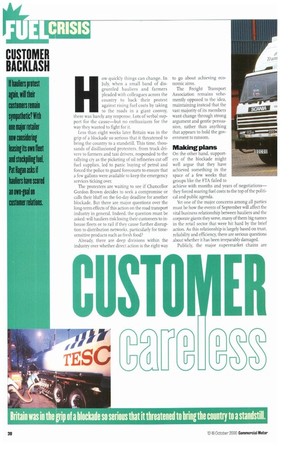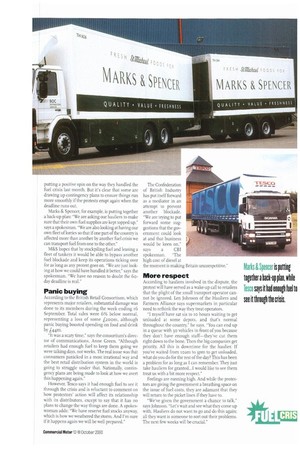H ow quickly things can change. In July, when a small
Page 40

Page 41

If you've noticed an error in this article please click here to report it so we can fix it.
band of disgruntled hauliers and farmers pleaded with colleagues across the country to back their protest against rising fuel costs by taking to the roads in a giant convoy, there was barely any response. Lots of verbal support for the cause—but no enthusiasm for the way they wanted to fight for it.
Less than eight weeks later Britain was in the grip of a blockade so serious that it threatened to bring the country to a standstill. This time, thousands of disillusioned protesters, from truck drivers to farmers and taxi drivers, responded to the rallying cry as the picketing of oil refineries cut off fuel supplies, led to panic buying of petrol and forced the police to guard forecourts to ensure that a few gallons were available to keep the emergency services ticking over.
The protesters are waiting to see if Chancellor Cordon Brown decides to seek a compromise or calls their bluff on the 6o-day deadline for another blockade. But there are major questions over the long-term effects of this action on the road transport industry in general. Indeed, the question must be asked: will hauliers risk losing their customers to inhouse fleets or to rail if they cause further disruption to distribution networks, particularly for timesensitive products such as fresh food?
Already, there are deep divisions within the industry over whether direct action is the right way
to go about achieving economic aims.
The Freight Transport Association remains vehemently opposed to the idea, maintaining instead that the vast majority of its members want change through strong argument and gentle persuasion, rather than anything that appears to hold the government to ransom.
Making plans
On the
supporters of the blockade might well argue that they have achieved something in the space of a few weeks that groups like the FTA failed to achieve with months and years of negotiations— they forced soaring fuel costs to the top of the political and public agenda.
Yet one of the major concerns among all parties must be how the events of September will affect the vital business relationship between hauliers and the corporate giants they serve, many of them big names in the retail sector that were hit hard by the brief action. As this relationship is largely based on trust, reliability and efficiency, there are serious questions about whether it has been irreparably damaged.
Publicly, the major supermarket chains are putting a positive spin on the way they handled the fuel crisis last month. But it's clear that some are drawing up contingency plans to ensure things run more smoothly if the protests erupt again when the deadline runs out.
Marks & Spencer, for example, is putting together a back-up plan: "We are asking our hauliers to make sure that their own fuel supplies are kept topped up," says a spokesman. "We are also looking at having our OVal fleet of lorries so that if one part of the country is affected more than another by another fuel crisis we can transport fuel from one to the other."
M&S hopes that by stockpiling fuel and leasing a fleet of tankers it would be able to bypass another Fuel blockade and keep its operations ticking over for as long as any protest goes on. "We are just looking at how we could have handled it better," says the spokesman. "We have no reason to doubt the 6oday deadline is real."
Panic buying
According to the British Retail Consortium, which represents major retailers, substantial damage was done to its members during the week ending 16 September. Total sales were 6% below normal, representing a loss of some izoom, although panic buying boosted spending on food and drink by .i44m
"It was a scary time," says the consortium's director of communications, Anne Green. "Although retailers had enough fuel to keep them going we were tallcing days, not weeks. The real issue was that consumers panicked in a most irrational way and the best retail distribution system in the world is going to struggle under that. Nationally, contingency plans are being made to look at how we avert this happening again."
However, Tesco says it had enough fuel to see it through the crisis and is reluctant to comment on how protestors' action will affect its relationship with its distributors, except to say that it has no plans to change the way things are done. A spokeswoman adds: "We have reserve fuel stocks anyway, which is how we weathered the storm. And I'm sure if it happens again we will be well prepared."
The Confederation of British Industry has put itself forward as a mediator in an attempt to prevent another blockade. "We are trying to put forward some suggestions that the government could look at and that business would be keen on," says a CBI spokesman. "The high cost of diesel at the moment is making Britain uncompetitive."
More respect
According to hauliers involved in the dispute, the protest will have served as a wake-up call to retailers that the plight of the small transport operator cannot be ignored. Len Johnson of the Hauliers and Farmers Alliance says supermarkets in particular need to rethink the way they treat operators.
"I myself have sat six to ic hours waiting to get unloaded at some depots, and that's normal throughout the country," he says. "You can end up in a queue with 30 vehicles in front of you because they don't have enough staff—they've cut them right down to the bone. Then the big companies get priority. All this is downtime for the haulier. If you've waited from loam to 3pm to get unloaded, what do you do For the rest of the day? This has been a problem for as long as I can remember. They just take hauliers for granted...I would like to see them treat us with a bit more respect."
Feelings are running high. And while the protestors are giving the government a breathing space on the issue of fuel costs, they are adamant that they will return to the picket lines if they have to.
"We've given the government a chance to talk," says Johnson. "Let's wait and see what they come up with. Hauliers do not want to go and do this again; all they want is someone to sort out their problems. The next few weeks will be crucial."












































































































